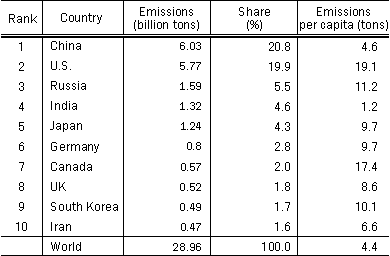The 15th Session of the Conference of the Parties to the United Nations Framework Convention on Climate Change (COP15), being held in Copenhagen in December 2009, is discussing the framework to replace the Kyoto Protocol and submit target reductions in greenhouse gas emissions and plans of action toward 2050.( note 1 ) Observers are hoping for a positive contribution from China - now the world's largest emitter of greenhouse gases - to help make COP15 a success and avoid the potential for disaster resulting from the destruction of the environment.
China is a major power with a population of 1.3 billion. Its energy consumption has risen sharply in recent years, driven by high economic growth, and the country has become the world's second largest energy consumer after the United States. With carbon dioxide (CO 2 ) emissions reaching 6.03 billion tons in 2007, China is now the world's largest emitter, surpassing the United States (5.77 billion tons) for the first time, partly because of its comparatively high dependency on coal and other fossil fuels ( table 1 ). On a per capita basis, however, the energy consumption and CO 2 emissions of China remain much lower than those of developed nations. In light of this, energy consumption - and CO 2 emissions for that matter - is likely to continue to increase in the future in step with its economic growth. Given that massive emissions of CO 2 are believed to be a cause for global warming, with an impact not limited to China but potentially global, China must take advantage of COP15 and other opportunities to work with the international community in finding a solution.
Table 1: Top 10 Countries by CO 2 Emissions (2007)

(Source) International Energy Agency, Key World Energy Statistics , 2009
At a number of international forums on climate change, China has shown a cooperative approach but has consistently emphasized voluntary efforts, sheltering behind the principle of "common but differentiated responsibilities."( note 2 )
In other words, "Both developed and developing countries should take action to decelerate and adapt to climate change. But the level of their historical responsibilities, the level and stage of their development, and their abilities and means of contribution vary. Developed countries should be responsible for their accumulated emissions and current high per-capita emissions, and should take the lead in reducing emissions, in addition to providing financial support and transferring technologies to developing countries. Developing countries, while building their economies and fighting poverty, should actively adopt adaptation measures, reduce their emissions to the lowest degree and fulfill their duties in addressing climate change." ("China's Policies and Actions for Addressing Climate Change" of the Information Office of the State Council, October 2008)
On the basis of this principle, China, as a developing country, is not obliged to announce or meet any emission targets. But as an emerging economic power and the world's largest emitter of CO 2 , China should fulfill its responsibility in providing the international public good of improving the global environment, including the prevention of warming. Professor Hu Angang of Tsinghua University proposes that China set a numerical target for an emissions reduction as a binding international commitment to meet such expectations.
In response, the Chinese government announced for the first time in November 2009, just prior to COP15, a target of lowering CO 2 emissions per unit of GDP (the amount of CO 2 that is emitted in the process of producing one unit of GDP) in 2020 by 40-45% compared with the level of 2005. The announcement has prompted some criticism from other countries because the target is set not for an absolute level of emissions but an amount relative to the size of GDP and is only a voluntary, rather than an internationally binding one. Still, the announcement should be valued as a step forward, compared with China's past stance. It is expected to encourage the active involvement of other countries in establishing an international framework for cooperation in the post-Kyoto Protocol negotiations, which are very likely to be highly difficult.


